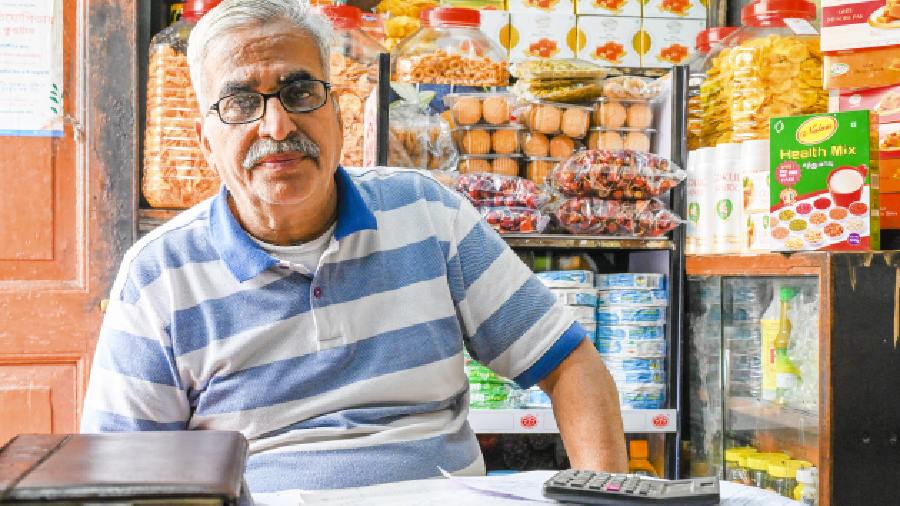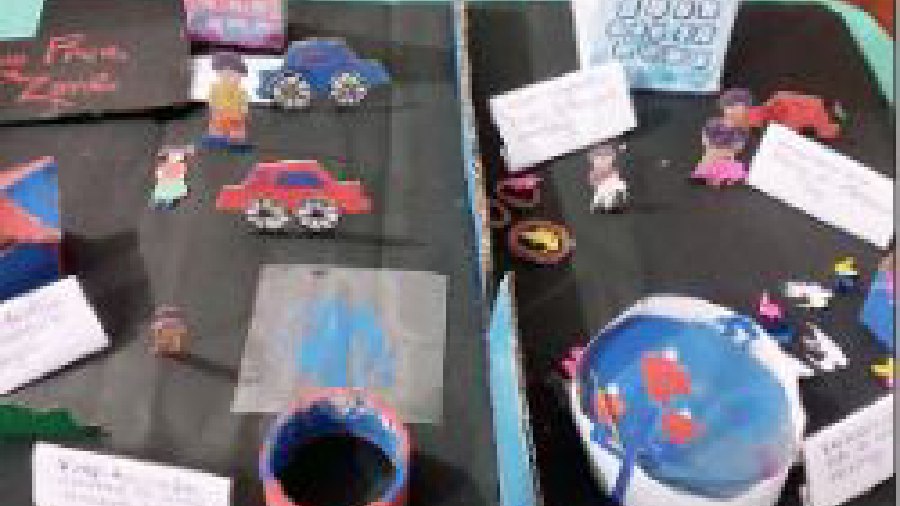You have a strange feeling as you find yourself inside Ashok Stores on Sarat Bose Road (formerly Lansdowne Road) in south Kolkata, as if it may not be real. It is a small shop bursting with jars, bottles and plump packets, so old-Kolkata with its three steps leading to a narrow entrance, its modest signboard on the wall outside with the shop name written in Bengali and English in old fonts, its unpainted exterior and an absolute disregard for display and decoration, that it looks like the stereotypical neighbourhood store from a few decades ago. In contrast with the LED-drenched shops along Deshapriya Park on the other side of the road, it does not even boast of enough light.
All this is so “authentic” old Kolkata, that you feel afraid that this may actually be an installation, like a decrepit old building with sinuous banyan tree roots clamping can turn out to be a Durga Puja pandal.
But it is not. Ashok Stores, despite looking like an anachronism, is a buzzing, thriving shop and a mini universe, with customers having to squeeze themselves in here at times. Behind a small table sits Ravi Shankar, 70, its proprietor.
The shop was a lifeline for the south Indian communities in the city, who lived mainly in this area. It sold — and still sells — all food products used in cooking in all the south states. Now many from the southern communities have left Kolkata, but that has not made a difference to his shop, assures Ravi, a genial, bustling man, who goes about his business briskly. “Now more than south Indian people, others buy south Indian products,” he laughs.
A Tamil by birth, he is equally fluent in English, Bengali and Hindi, and speaks Tamil at home. He greets his customers, some of them having become close friends through the decades, into his shop warmly. Often you hear intense conversations, though the presence of the participants may shrink the space further.
Ravi takes you on a tour of the shop proudly as you learn to navigate packed shelves and a full flood of masala sachets hanging overhead. You step away from a special variety of dark-skinned potato, and also a few coconuts. Each of the large jars on the counter, with varieties of murukku, tapioca and banana chips, is a big temptation.
Papads, in a wide range, including a tapioca variety, are one of the best-selling items, along with coffee. “We sell coffee with chicory, and coconut and sesame oils for cooking. We also have a special kind of ghee,” says Ravi.
The pickles are impressive, with a very spicy raw mango variety. A series of halwas, ghee Bombay halwa and mango halwa, and Mysore Pak, fills a shelf next to a stack of rice noodles, resting close to packets of instant Ragotine.
The most bewildering range, however, is of the spices and ready-mix masalas.
With the regular sambar and rasam mixes and lemon rice and puliyogare rice are garlic rice powder, ghee dhal powder and a karela powder. Small sachets of Samahan offer relief from cold when mixed with hot water. “All products are sourced from various parts of south India,” says Ravi.
It is a small garden of earthly delights, waiting to unlock its sharp, distinct flavours, promising glimpses into ways of life that lie outside the everyday and the familiar, yet next to us.
But Ravi does not seem to have time for any lofty assumptions. Nor does he seem to see his shop as anything different. Rather, he appears to derive his pride from the fact that it as an intrinsic part of his locality.
He looks at himself the same way: as someone born and brought up in Kolkata.
His grandfather had come to Calcutta from Madras to work in the government rehabilitation department during the British Raj, and settled down in south Kolkata’s Lake Road with his family. Ravi still lives there, with his son. His father worked briefly for the American army, around World War II — “I don’t know any more about this,” Ravi adds. He tells the story briefly even as he keeps issuing clear instructions to the two young men who help him at the shop.
“The shop has always sold these things. Not much has changed. My father set up the shop about 70 years ago,” he says. “I grew up like any other boy in the area, playing in the streets. I went to National High School here and then studied commerce at St Xavier’s College. College used to give over in the morning and I would come here to help my father. I also studied law at Hazra Law College. Then I took over the shop from my father,” Ravi says. “I have no regrets.”
He says that the one big change he has seen in the locality is the departure of many South Indian families. A number of temples, schools and clubs set up by the communities remain, but not too many people. The view from his shop, though, where he spends most of the day, has hardly changed.
“Kolkata is the best city,” he says. “The people are good, the roads are good. The public transport is especially good. In any other city, you spend much more travelling. But in Kolkata you have shared autorickshaws,” he says.
“I have not been to many places. But I have been to Chennai and Bangalore. I feel life in Kolkata is much easier,” he says.
“As south Indians, we feel respected,” he says. “The city is tolerant of everyone.”
Then why is it that ontop of the shop someone has written in large black letters two abusive Bengali words, in Roman script, obviously aimed at him? For the first time Ravi loses his composure. He looks angry. He says some miscreants wrote them. Why did he not erase them?
“I will not,” he says, raising his voice.
“They will be there. I want those people to see them everyday and remember the wrong that they have done.”

